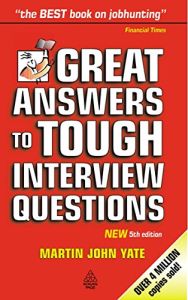Join getAbstract to access the summary!

Join getAbstract to access the summary!
Martin John Yate
Great Answers to Tough Interview Questions
Kogan Page, 2001
What's inside?
Conquer your job hunt with skills that will ace interviews, outshine other candidates and yield high-paying offers.
Recommendation
You may feel waves of regret as you read this book and imagine how your life might have been different if you had studied it earlier in your career. With actual examples of resumes and a brilliant score of responses to difficult queries, this is an excellent guide for job hunters, complete with corporate fashion tips. Author Martin John Yate delivers savvy advice in plain language. With warnings about the dangers of "windbag" statements, industry jargon and hostile body language, Yate provides a no-nonsense tour through the job-hunting process. The text includes a great worksheet for developing and tracking job leads and contacts. Unfortunately, the author sometimes is gung-ho about specific points so some sections are repetitive. But overall, getAbstract recommends these insights to all job seekers.
Summary
About the Author
Martin John Yate has held top positions in training and personnel for several leading international companies. He is also the best-selling author of Resumes That Knock ’Em Dead, Knock ’Em Dead Business Presentations and Hiring the Best, among other business books.
















Comment on this summary